
Dr. Okoi Arikpo (20 September 1916 – 26 October 1995 [1] ) [2] [3] [ better source needed ] was a Nigerian chemist, anthropologist, lawyer, politician and diplomat. He served as the foreign minister of Nigeria. [4]

Dr. Okoi Arikpo (20 September 1916 – 26 October 1995 [1] ) [2] [3] [ better source needed ] was a Nigerian chemist, anthropologist, lawyer, politician and diplomat. He served as the foreign minister of Nigeria. [4]
Okoi Arikpo was born in Ugep in 1916. He was educated at the famous Hope Waddell Training Institution in Calabar. He was awarded a First Class Degree in Chemistry in the University of London. He changed into anthropology and got a Doctorate Degree at University College, London. He later studied Law and was called to the English bar in 1956. He authored many books including the classic The Development of Modern Nigeria (1967). He was reputed[ by whom? ] to be the first West African to be awarded a Doctor of Philosophy Degree in Anthropology.
Dr. Okoi Arikpo was President of the West African Student's Union in the United Kingdom in the early 1940s. This organization was the rally point for students from West Africa who were studying in the Great Britain. WASU was lobbying members of the British Parliament to draw their attention to the political problems facing African Colonies and their leaders back home in different African Countries. The organization was the pivot for galvanization for support of some left thinking people to the plight of the colonial territories. WASU was the fulcrum of social and political activities of Students and people of West African Origin in the United Kingdom. Some of its activities include lobbying members of the British Parliament to draw their attention to the political problems facing African Colonies and their leaders.
Dr. Okoi Arikpo was the first Minister for Lands & Survey in the Nigerian Government that was formed after the Macpherson Constitution came into force. Okoi Arikpo was one of the four Legislators elected into the Eastern Regional House of Assembly who were chosen to represent the Eastern Region in the Central House of Legislature in Lagos that was promulgated after the coming into force of the Macpherson Constitution. Okoi Arikpo was also a cabinet Minister in the 1957 Government formed by Sir Abubukar TafawaBalewa.
Okoi Arikpo was an Activist. He was at the vanguard of the campaign to draw the attention of the Colonial Government to the plight of the minority people of the Eastern and Northern Region. He resigned from the NCNC in protest at the treatment meted out to the then Leader of Government Business in the Eastern Nigerian Government, late Professor Eyo Ita, who was pressured by the leadership of the NCNC to step down in order for Dr. Nnamdi Azikiwe to assume the position he was occupying after he had lost out in the power struggle in the Western Nigeria where members of this Party in the Western Region had succumbed to pressure mounted on them not to allow Dr. Azikiwe, an Igbo become leader of Government Business after his Party won the Western Regional election.
Thereafter Dr. Okoi Arikpo teamed with other minority rights activists to form the United Nigeria Independence Party which later allied with the Action Group as the opposition in the Eastern Region. He was in the forefront of the fight for autonomy of the ethnic minorities in the East for a creation of the Calabar/Ogoja/ Rivers State. He was the Secretary-General of the COR State and Honourable Justice Udo Udoma was the President.
Okoi Arikpo was among the people from the minority ethnic groups who drafted and articulated the position of the minority groups in the country before the Willink Commission was set up by the departing British colonizers to examine the fears of minorities of the Niger Delta. The Willink Commission called attention to the grave dangers in the Niger Delta.
Okoi Arikpo was the first Executive Secretary of the National Universities Commission. Okoi Arikpo was the longest serving Minister for Foreign Affairs (External Affairs) 1967 - 1975. He was the person who was sent to all the Western Capitals and the United States of America to make a strong case why Nigeria should not be allowed to be Balkanized during the heady days of the Civil War. This was after the secessionist Regime had launched a vehement and vociferous propaganda in Western Capital and the United States of a deliberate policy of genocide being waged against the Igbo people of Nigeria which always turned the scale against Nigeria. Okoi Arikpo, a cerebral intellectual of no mean standing, employed his formidable intellectualism and savvy to turn the tide against the Biafra Regime.
In the Africa continent, Okoi Arikpo's effort to ensure that Biafra does not win more recognition after the dramatic recognition accorded it by France, Cote de Voire, Tanzania and Gabon was commendable. A commentator noted thus
“Meanwhile, the OAU Council of Ministers meeting in Kinshasa began on September 4 and lasted till September 11, 1967. The Council meeting normally prepares the agenda for the Heads of State meeting. Okoi Arikpo, Gowon's External Affairs minister had a short but firm mandate for the preparatory meeting: ‘Under no circumstances allow the Nigerian crisis to appear on the agenda for the OAU Summit.’ To back up his mandate, Arikpo would cite Article II (2) of the OAU Charter, which states that member states should not interfere in the internal affairs of other members unless invited to do so. He also insisted that Nigeria was not keen to invite the mediation of a third party. Gowon also mandated Arikpo to stage a walk-out from the Summit should the matter, by any means, appear on the agenda or be mentioned during the Summit’’.
“The pivotal role that the Ministry of External Affairs was able to play in the foreign policy decision-making system was also due to the sort of leadership that the Commissioner for External Affairs was able to provide. Dr. Okoi Arikpo, who was the Commissioner, was a respected politician and an able administrator. His steady and competent leadership earned respect and support of the career diplomats who dominated the Ministry of External affairs. Arikpo’s ability to work effectively with the career diplomats was also enhanced by his cautious and moderate foreign policy approach shared by the career diplomats. The effective and competent manner in which Arikpo and the Ministry of Foreign Affairs that he headed managed Nigeria’s international relations during the Civil War period and the immediate Post- War period showed that Gowon’s Government was correct in allowing the Ministry to have clear primacy in the foreign decision making system. During the Civil War, the Ministry was able to help Nigeria to develop new vital relationships with East European (Military weapons from the Soviet Union and other East European countries) were very important in helping the Nigeria Military extinguish the seccession of Biafra) while still maintaining adequate relationships with the traditional friendly countries of the West’’.
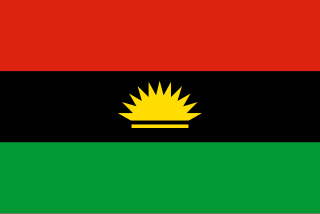
Biafra, officially the Republic of Biafra, was a partially recognised country in West Africa that declared independence from Nigeria and existed from 1967 until 1970. Its territory consisted of the former Eastern Region of Nigeria, predominantly inhabited by the Igbo ethnic group. Biafra was established on 30 May 1967 by Igbo military officer and Eastern Region governor C. Odumegwu Ojukwu under his presidency, following a series of ethnic tensions and military coups after Nigerian independence in 1960 that culminated in the 1966 anti-Igbo pogrom. The Nigerian military proceeded to attempt to reclaim the territory of Biafra, resulting in the start of the Nigerian Civil War. Biafra was formally recognised by Gabon, Haiti, Ivory Coast, Tanzania, and Zambia while receiving de facto recognition and significant military support from France. After nearly three years of war, during which around two million Biafran civilians died, President Ojukwu fled to Ivory Coast in exile as the Nigerian military was approaching the capital of Biafra. Philip Effiong became the second president of Biafra, and he oversaw the surrender of Biafran forces to Nigeria.

Nnamdi Benjamin Azikiwe, PC, usually referred to as "Zik", was a Nigerian statesman and political leader who served as the third Governor-General of Nigeria and first president of Nigeria during the First Nigerian Republic which existed from 1963 to 1966. Considered a driving force behind the nation's independence, he came to be known as the "father of Nigerian nationalism".
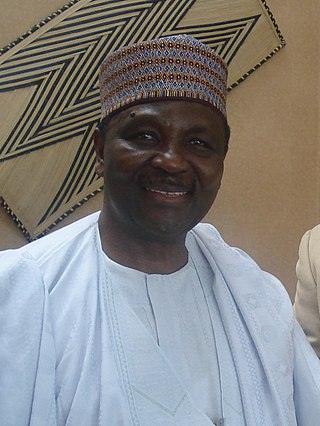
Yakubu Dan-Yumma "Jack" Gowon is a retired Nigerian army general and military leader. As head of state of Nigeria, Gowon presided over a controversial Nigerian Civil War and delivered the famous "no victor, no vanquished" speech at the war's end to promote healing and reconciliation. The Nigerian Civil War is listed as one of the deadliest in modern history, with some accusing Gowon of crimes against humanity and genocide. Gowon maintains that he committed no wrongdoing during the war and that his leadership saved the country.

The Nigerian Civil War, also known as the Nigerian–Biafran War or the Biafran War, was a civil war fought between Nigeria and the Republic of Biafra, a secessionist state which had declared its independence from Nigeria in 1967. Nigeria was led by General Yakubu Gowon, while Biafra was led by Lieutenant Colonel Chukwuemeka "Emeka" Odumegwu Ojukwu. Biafra represented the nationalist aspirations of the Igbo ethnic group, whose leadership felt they could no longer coexist with the federal government dominated by the interests of the Muslim Hausa-Fulanis of Northern Nigeria. The conflict resulted from political, economic, ethnic, cultural and religious tensions which preceded the United Kingdom's formal decolonisation of Nigeria from 1960 to 1963. Immediate causes of the war in 1966 included a military coup, a counter-coup, and anti-Igbo pogroms in Northern Nigeria.

The Eastern Region was an administrative region in Nigeria, dating back originally from the division of the colony Southern Nigeria in 1954. Its first capital was Calabar. The capital was later moved to Enugu and the second capital was Umuahia. The region was officially divided in 1967 into three new states, the East-Central State, Rivers State and South-Eastern State. East-Central State had its capital at Enugu, which is now part of Enugu State.
The National Council of Nigeria and the Cameroons (NCNC) later changed to the National Convention of Nigerian Citizens, was a Nigerian nationalist political party from 1944 to 1966, during the period leading up to independence and immediately following independence.

Prince Abyssinia Akweke Nwafor Orizu was a Nigerian of Igbo origin who served as President of the Nigerian Senate from 1963 to 15 January 1966, during the Nigerian First Republic. Orizu was also Acting President of Nigeria from late 1965 until the military coup of January 1966. He was a member of the Nnewi Royal family. His nephew Igwe Kenneth Onyeneke Orizu III is the current Igwe (King) of Nnewi Kingdom. Nwafor Orizu College of Education in Nsugbe, Anambra State, is named after him.
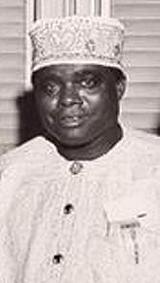
Jaja Anucha Ndubuisi Wachuku was a Pan-Africanist and a Nigerian statesman, lawyer, politician, diplomat and humanitarian. He was the first Speaker of the Nigerian House of Representatives; as well as the first Nigerian Ambassador and Permanent Representative to the United Nations. Also, Wachuku was the first Nigerian Minister for Foreign Affairs. Notably, Wachuku was a Royal Prince of Ngwaland, "descendant of 20 generations of African chiefs in the Igbo country of Eastern Nigeria".

The Nigerian foreign ministry is a statutory body created to reinforce foreign decision making and implementation processes in Nigeria and handle the external promotion of Nigeria's domestic vision and ideals; it is headed by a federal executive cabinet minister. As of late its mission has geared towards increasing awareness about Nigeria's economic potential. It is part of the government's executive branch.

Matthew Tawo Mbu was a Nigerian lawyer, politician, diplomat, and a permanent fixture in Nigerian political affairs for more than fifty years.

The Yakurr live in five compact towns in Cross River State, Nigeria. They were formally known as Umor, Ekoli, Ilomi, Nkoibolokom and Yakurr be Ibe. Due to linguistic problems encountered by the early European visitors, the settlements have come to be known by their mispronounced versions – Ugep, Ekori, Idomi, Nko and Mkpani. In the latter, it is a product of yakpanikpani, a name, which Enang (1980) says was given to them by the Ugep people after being tricked in a conflict.

The First Republic was the republican government of Nigeria between 1963 and 1966 governed by the first republican constitution. The country's government was based on a federal form of the Westminster system. The period between 1 October 1960, when the country gained its independence and 15 January 1966, when the first military coup d’état took place, is also generally referred to as the First Republic. The first Republic of Nigeria was ruled by different leaders representing their regions as premiers in a federation during this period. Leaders include Ahmadu Bello Northern Nigeria 1959–1966, Obafemi Awolowo Western Nigeria 1959–1960, Samuel Akintola Western Nigeria 1960–1966, Michael Okpara Eastern Nigeria 1960–1966, and Dennis Osadebay Mid-Western Nigeria 1964–1966.
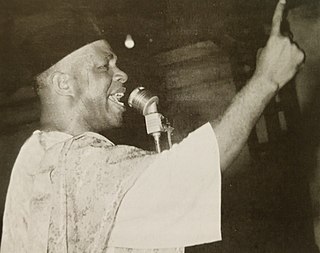
Kingsley Ozumba Mbadiwe (1915–1990) was a Nigerian nationalist, politician, statesman, and government minister in the Nigerian First Republic and a Biafran Roving ambassador during the civil war.
Eyo Ita (1903–1972) was a Nigerian educationist and politician from Creek Town, in present-day Cross River State, who was the leader of the Eastern Government of Nigeria in 1951 and the first Professor Nigeria ever had. He was one of the earliest Nigerian students who studied in the United States instead of the frequent route of studying in the United Kingdom. He was a deputy national president of the National Council of Nigeria and the Cameroons (NCNC) in the late 1940s and early 1950s.
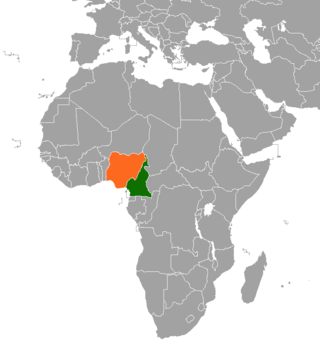
Relations between Cameroon and Nigeria were established in 1960, the same year that each country obtained its independence. Since then, their relationship has revolved in large part around their extensive shared border, as well as the legacy of colonial arrangements under which areas of Cameroon were administered as part of British Nigeria. The countries came close to war in the 1990s in the culmination of a long-running dispute over the sovereignty of the Bakassi peninsula. In the 21st century, however, a return to conviviality has been achieved, partly because the demarcation of their border has been formalised, and partly because the Boko Haram insurgency in the Lake Chad basin has necessitated increasingly close cooperation in regional security matters.

Government College Umuahia, or GCU, is an independent secondary school for boys located on Umuahia-Ikot Ekpene road in Umuahia, Nigeria.

Chief Theophilus Owolabi Shobowale Benson, S.A.N. was a Nigerian lawyer who became one of the most prominent Yoruba politicians in the period leading up to Nigerian independence in 1960. He served as the Minister of Information, Broadcasting and Culture in the first post-independence government. Benson was imprisoned for several months after the first military coup of 1966. He returned to practice as a barrister, and was recognised as a prominent Yoruba chief.

Igbo nationalism is a range of ethnic nationalist ideologies relating to the Igbo people of southeastern Nigeria. While the term is defined as seeking Igbo self-determination by some, others argue that it refers to the preservation and revival of Igbo culture and, for others, the development of Igboland stemming from the philosophy, Aku luo uno, which means "wealth builds the home".
Ibanga Akpabio was a Nigerian educator and government official who was a regional Minister of Education and later of Internal Affairs in the Eastern region, during Nigeria's first republic.
Sir Benedict Obidinma Odinamadu was a civil servant. He was the private Secretary to Dr. Nnamdi Azikiwe., Dr. M.I. Okpara while Premiers of Eastern Region of Nigeria respectively and First Secretary to the Military Government of Colonel Emeka Odumegwu Ojukwu.